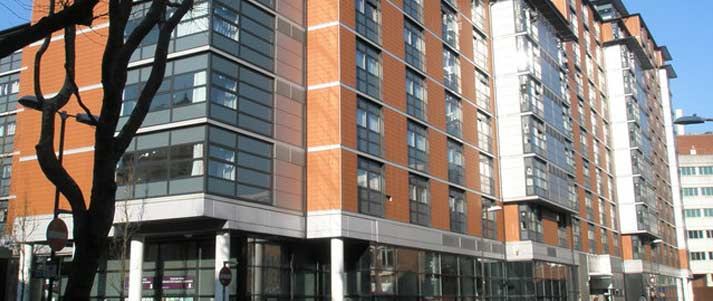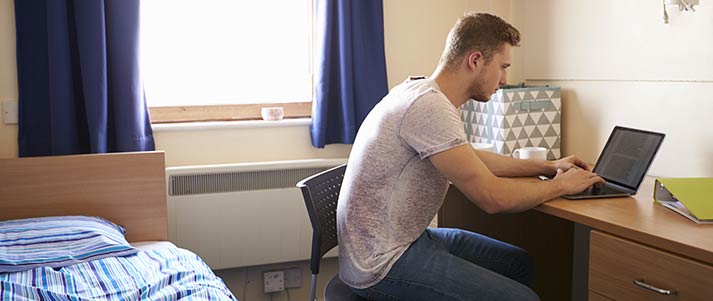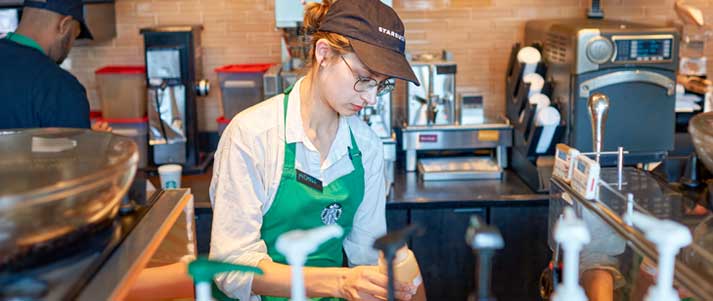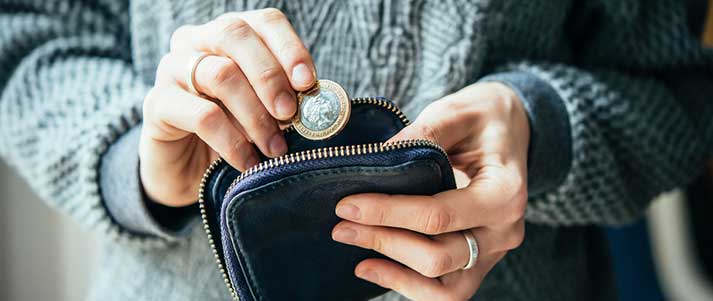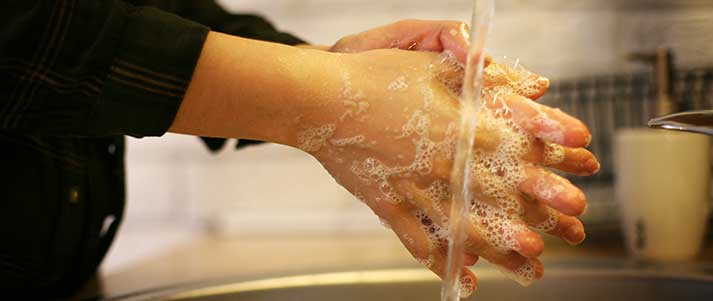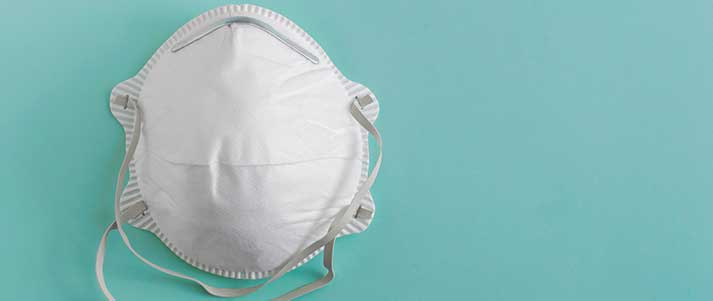The pandemic has affected students at every level. Will lectures be taught in-person at university? Will coronavirus affect Student Finance? Will you still have to pay rent at uni?
Credit: [email protected] – Shutterstock
It seems like only yesterday that the thought of self-isolating was a dystopian fantasy.
But it looks like coronavirus is here to stay for a while. Everything seems to have come to a bit of a halt (oh, social life, how we miss you) and there’s a lot of confusion around how coronavirus will affect going to university.
This guide will help you navigate renting, Student Finance and offer some tips if you’re struggling financially to cover basic needs. Rest assured – we’ll get through this together and come out stronger on the other side.
What’s in this guide?
- Student accommodation advice
- Can you get a refund from your university due to coronavirus?
- What will happen to your Student Loan?
- Coronavirus hardship funds for students
- How the pandemic impacts part-time jobs
- How to avoid spreading coronavirus at university
- Tips for making extra money
- Tips for saving money
Coronavirus and student accommodation
Whether you’re living in university halls or private accommodation, you’ll no doubt be wondering how coronavirus impacts your living situation at uni.
Here’s the key info you need to know, including your rights as a student tenant if you want (or need) to leave your uni accommodation early.
Students in university halls of residence
Credit: Basher Eyrer – Geograph
There’s been a huge amount of media coverage about students in university accommodation recently.
It’s no secret that students across the country have found themselves in pretty tough circumstances, with many needing to start self-isolating soon after moving into halls.
So, if you’re currently based in university halls, you won’t be alone in wondering what your rights are as a student tenant, and what your options are moving forwards.
Can you get rent refunds for university accommodation?
If you’re living in a hall of residence, whether or not you can receive a rent rebate or a break from paying rent will be down to your university.
As an example of where this has happened, the University of Glasgow refunded a month’s worth of rent to students in their halls. This came after 124 student residents tested positive for coronavirus, causing around 600 to self-isolate.
If your university doesn’t offer you a refund but you think you should be entitled to one, it could be worth reaching out to a representative of your halls of residence.
You can present a case to them on why you think you deserve compensation and, if they’re not able to help, they may be able to direct you to someone who can.
Make sure you know your rights as a tenant. And, to strengthen your case, collect as much evidence as you can to show why you think you haven’t received your money’s worth.
What happens if you move out of university halls early?
Credit: Monkey Business Images – Shutterstock
Although universities aren’t obliged to waive or refund your rent if you need to leave halls early, some may decide to.
Compared to those living in private accommodation, you may have more chance of getting a reduction in rent or an early termination of the contract, but there’s no guarantee.
A senior housing expert from Citizens Advice, Amy Hughes, said:
It’s always worth getting in touch with your landlord and trying to negotiate. But realistically, if there is no obligation for them to release you from the contract, they may well be unwilling to do so.
Where the landlord is the university, they may be more sympathetic to a short-term reduction in rent, or ending a contract early, if there is no longer any reason for you to remain in halls.
However, it is early in the academic year, and it may be difficult to find alternative halls of residence accommodation if a student gives up their place, but later wishes to return.
Students in private accommodation
Credit: John Seb Barber – Flickr
Although it can be tricky for students in university halls, it can be harder still to get refunds or terminate contracts early when you’re renting privately.
Privately-rented accommodation can include student houses, flats and private halls (i.e. ones owned by a company rather than your university).
Can you get rent refunds for private accommodation?
Although some landlords may be generous and waive your rent if you need to move out early, this is very unlikely. You are contractually bound to continue covering the rent of your accommodation for however long is stated in your tenancy agreement.
But, you may be able to terminate the contract early if you have a break clause in the agreement.
For example, if you signed up for a one-year let but you have a six-month break clause, this means that you should be able to end the agreement any time after six months – you’ll just need to pay rent for the notice period, then you should be fine to move out and stop paying rent.
Can you get a refund on your tuition fees?
One question that a lot of students will be wondering is: could you get compensation from your university due to the coronavirus pandemic?
It is a possibility that you could be entitled to compensation, but we would stress that it’s by no means guaranteed.
For starters, it was unfortunately confirmed by the government in May 2020 that, even if universities offer teaching online, students would still be expected to pay full tuition fees – on the condition that the online teaching is up to scratch.
And, in October 2020, the Universities Minister, Michelle Donelan, built on this to say:
It would be unacceptable for a student to be paying those tuition fees and not getting that quality or not getting that support.
If you think that there is inadequate support or quality at your uni, this is one line of argument you could make if you do wish to claim for compensation.
Overall, it’s important to think carefully about what you were offered when you applied for your course, and whether you think you have received an adequate uni experience.
How to claim compensation from your university due to coronavirus
Credit: Atanas Bezov – Shutterstock
Are you confident you haven’t received your money’s worth at uni? The first steps are to outline exactly why you feel this way, collecting as much evidence as you can to build up a case. Then, approach your university with your complaint.
If you are unhappy with the university’s response, you would then have the option to take your complaint further to an ombudsman if you wish.
These are the ombudsman services that you can approach with your complaint, depending on whereabouts in the UK you’re based:
- Office of the Independent Adjudicator for Higher Education (OIA) – For students in England and Wales
- Scottish Public Services Ombudsman (SPSO) – For students in Scotland
- Northern Ireland Public Services Ombudsman (NIPSO) – For students in Northern Ireland.
The ombudsman will consider your complaint, and if they think it’s justified, they’ll make a suggestion to your university on how they should respond. For example, if they think you should be compensated, they will say this to your uni and give a suggested amount.
For more info and advice about claiming compensation from university, check out our in-depth guide which explains the process, step-by-step.
How coronavirus could affect Student Finance
Good news: in terms of your Student Loan, it’s basically business as usual.
You should have received the scheduled payment of your Maintenance Loan at the start of the summer term, regardless of whether or not your university has made alternative arrangements for teaching.
Will students still receive Student Finance during the pandemic?
Yes! Student Finance is absolutely still available to students during the 2020/21 academic year. If your Maintenance Loan is late or you’ve been having a problem with your Student Finance application, we’d advise you to contact your Student Finance provider.
You could receive a higher Student Loan if your household income has gone down in 2020/21
Credit: Ink Drop – Shutterstock
If your household has experienced a loss of income due to COVID-19, you may be entitled to receive a higher Maintenance Loan. This is because, if your household income drops by a certain amount (more on this shortly), you could complete a Current Year Income Assessment.
Usually, when you apply for Student Finance, wherever in the UK you are, you’re asked to provide information about your or your parents’ income from the previous tax year to work out how much Maintenance Loan you’re entitled to.
Because of this, the amount of Maintenance Loan you’d get would be calculated based on how much your parents earned (or how much you earned if you’re financially independent) two years ago.
If your household income is lower now than it was then, you may be able to provide details of your income for this current tax year instead of last year’s. You must then keep your income details up to date during the year and confirm your actual income at the end of the tax year.
Here’s a rundown of the minimum income drops required to qualify for a Current Year Income Assessment in each part of the UK:
- Student Finance England – 15% drop in household income
- Student Finance Northern Ireland – 5% drop in household income
- SAAS (Scottish Student Finance) – A drop in household income to a lower income bracket (the income brackets are outlined here)
- Student Finance Wales – 15% drop in household income.
What happens to Student Finance when you drop out of uni?
Credit: Olena Yakobchuk – Shutterstock
If you’re thinking about dropping out of university due to the challenges posed by coronavirus, it’s important not to rush into this decision. Contact your tutor and student support services at uni to discuss your options, and see if there’s anything more they can do to support you.
Then, if you still decide that it would be the right decision for you to withdraw from your degree, make sure you’re familiar with how this impacts your Student Loan. In particular, it’s important to know that there will be money that you’ll need to repay if you’ve had a Tuition Fee Loan and/or a Maintenance Loan.
Firstly, you may need to pay back a portion of your Maintenance Loan immediately if you drop out midway through a term. For example, if you drop out exactly halfway through the semester, you might be asked to start paying back half of your most recent loan instalment straight away.
If this is the case, you should be able to chat with SLC to discuss an affordable repayment plan.
For the rest of your Student Loan, you won’t need to start paying it back until the April after you withdraw from your course, and only then when you’re earning above the repayment threshold.
We can talk you through all of this in our guide on what happens to your Student Loan if you drop out of university.
Student Finance for students who are studying abroad
Students on a year abroad who have needed to return home and complete their studies remotely will still receive their Student Finance package for tuition fees and living costs.
If you’d been hoping to get a travel grant for your time abroad, you can still submit your claim as long as you’ve spent at least 50% of your term abroad. Plus, there won’t be a change to any payments you’ve already received.
Coronavirus hardship fund
Credit: wavebreakmedia – Shutterstock
Universities and higher education providers in England, Northern Ireland, Scotland and Wales have also been allocated grants to put towards student hardship funds and mental health support. These grants should be available directly through your university.
Student support services will assess the hardship payments at their discretion and may give priority to some students based on their needs.
If you’re struggling financially, it’s definitely worth approaching your university to find out whether you might be eligible for a hardship fund.
If coronavirus has taken its toll on your mental health, we’d also encourage you to approach your university’s support services – they may have special measures in place to help you manage the challenges posed by the pandemic.
Do you have to repay your Student Loan if you can’t work because of coronavirus?
You only start repaying your Student Loan from April in the year after you leave uni, and even then it’s only when earning over the repayment threshold.
So, if you’re a graduate and you’ve lost some or all of your income due to coronavirus, please try not to worry about your Student Loan repayments – if your income drops below the threshold, the payments will stop until you begin earning more again.
For more information on Student Finance and COVID-19, check out the Student Loans Company (SLC) website.
How coronavirus will affect students with part-time jobs
Credit: Sorbis – Shutterstock
Worried about how the pandemic could impact your part-time job? You may be able to receive support through the Coronavirus Job Retention Scheme.
Read on for the key info about the scheme. Or, if you’re finding it difficult to find a part-time job, we go through some additional ways that you can access and make money below.
Coronavirus Job Retention Scheme
The government has rolled out supportive measures known as the Coronavirus Job Retention Scheme, which helps to cover the wages of employees in companies that have been hit financially by the pandemic.
Grants have been given to businesses so that employees can receive 80% of their wages. This system basically allows employers to put people’s jobs on hold, or on ‘furlough’, and provide them with some income in the meantime.
The scheme is set to run through until the end of October 2020, which means that if you’ve been put on furlough, your employer should be eligible to claim until then.
As the government has said that businesses can now bring furloughed employees back part-time, it’s up to companies to decide the hours and shift patterns their employees will work and will be responsible for paying their wages.
The idea is that employer payments substitute part of the government’s contribution while staff continue to receive at least 80% of their original salary, up to £2,500 a month.
Currently, the government can pay 60% of wages up to a cap of £1,875. Employers pay National Insurance and pension contributions and 20% of wages – this means that employees will still receive 80% of wages up to a cap of £2,500.
Who is eligible for furlough?
Credit: fizkes, Ilya Sergeevych – Shutterstock
Anyone who was employed and on their employer’s PAYE payroll by 19th March of this year (the initial cut-off date of 28th February was extended by the government in April) on a full-time contract, part-time contract, through an agency, or on a flexible or zero-hours contract is eligible for furlough.
Unfortunately, if you had not been put on your employer’s payroll by 19th March, your employer will not be able to put you on furlough even though you were technically employed.
Foreign nationals are eligible to be furloughed, as are apprentices who may continue to train during this time (if the circumstances permit).
So if, for example, you had a job as a barista at a coffee shop which has had to temporarily close its doors, your employer could be given a grant which is designed to cover your wages while you’re on standby.
Employees of individuals who aren’t companies can also be put on furlough. This may be the case if you’re a nanny and you were put on payroll via HMRC’s PAYE scheme on or before 19th March.
If you had left a job to start a new one which fell through as a result of COVID-19, you may also still be entitled to furlough.
The government has also said that companies can rehire former employees that left their jobs after 28th February (the initial cut-off date) for a new job elsewhere that no longer exists because of coronavirus, in order to put them on furlough and provide them with an income.
If you rely on more seasonal part-time work – like, for instance, you only work during the Christmas period or over the summer – you might not have been able to claim furlough.
Furlough and taking annual leave in lockdown
Credit: Yulia Grigoryeva – Shutterstock
It’s worth noting that your employer can force you to take annual leave while you’re on furlough. You should still receive your usual pay and you should also receive enough notice to do so. For instance, if you’re being asked to take three days holiday, your employer should tell you this six days in advance.
The government has said that while you’re on annual leave, you’ll need to be paid your full holiday pay. So if you’re only receiving 80% of your salary at the moment your employer will need to make up the 20% so that you’re receiving your full holiday pay while you’re on annual leave. Show your employer this if they’re not following the rules…
How to avoid spreading coronavirus at university
It’s so, so important to follow the government’s guidelines to help prevent the spread of coronavirus at uni.
Remember that, even though you may have no problems at all recovering from the virus, for others it can be really serious.
This is why it’s essential to self-isolate if you or someone you’ve been in close contact with has a new and persistent cough, a high temperature and/or a loss or change to your sense of taste or smell.
On top of this, following measures like social distancing, wearing masks and regularly washing your hands can make a massive difference.
To avoid catching and spreading coronavirus, follow the ‘Hands, Face, Space’ guidelines:
-
Hands
Credit: Liderina – Shutterstock
Regularly wash your hands with soap and water for 20 seconds, drying them thoroughly afterwards.
And, when you’re out and about, use hand sanitiser (particularly when entering a building, and after you’ve had contact with surfaces).
-
Face
Credit: Antonio Rico – Shutterstock
Wear a face covering whenever required, such as on public transport, in shops and in libraries. It’s important to wear them whenever you’re in an enclosed public space where social distancing is difficult, and you’re around people you don’t usually meet.
Keep in mind, though, that some people are exempt from wearing face coverings, such as those with breathing difficulties.
-
Space
Credit: Halfpoint – Shutterstock
By social distancing and keeping a space between yourself and others, you can reduce the risk of getting or spreading coronavirus.
It makes a big difference as the virus is much more likely to pass between people when they’re close together.
Social distancing includes:
- Only meeting friends and family in groups of six or less
- Avoiding seeing too many different people socially over a short period of time
- Trying to meet outdoors rather than indoors whenever possible.
What is the science behind ‘Hands, Face, Space’?
This video outlines the science behind why it’s important to wash hands with soap and water regularly, wear a face covering, and leave a space between yourself and others:


